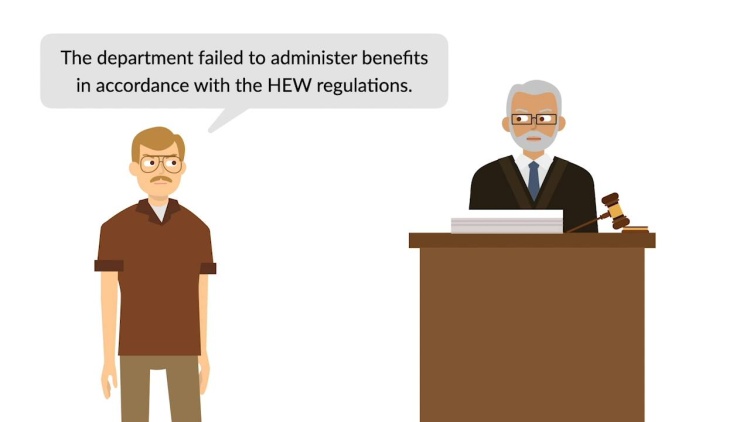Edelman v. Jordan
United States Supreme Court
415 U.S. 651 (1974)
- Written by Robert Schefter, JD
Facts
The State of Illinois operated a program of Aid to the Aged, Blind, or Disabled (AABD). Illinois received matching federal dollars for the program and agreed to comply with federal regulations governing the program. These federal regulations required an applicant’s eligibility to be determined and the first check to be delivered within 45 days of the date of an application. Illinois generally took up to four months to make the eligibility determination and paid benefits beginning with the month of the determination. Jordan was a recipient of benefits under the program and sued Weaver (defendant), the director of the Illinois Department of Public Aid, for violating the federal regulations and for violating the Equal Protection Clause. The trial court entered a permanent injunction requiring Illinois to comply with the federal regulations in the future. The trial court also ordered the state officials to pay all benefits wrongfully withheld since the implementation of the federal regulations. Weaver appealed to the United States Court of Appeals for the Seventh Circuit, which affirmed. Edelman (defendant) replaced Weaver as the director of the Illinois Department of Public Aid and petitioned the United States Supreme Court for review.
Rule of Law
Issue
Holding and Reasoning (Rehnquist, J.)
Dissent (Brennan, J.)
Dissent (Douglas, J.)
Dissent (Marshall, J.)
What to do next…
Here's why 904,000 law students have relied on our case briefs:
- Written by law professors and practitioners, not other law students. 47,100 briefs, keyed to 995 casebooks. Top-notch customer support.
- The right amount of information, includes the facts, issues, rule of law, holding and reasoning, and any concurrences and dissents.
- Access in your classes, works on your mobile and tablet. Massive library of related video lessons and high quality multiple-choice questions.
- Easy to use, uniform format for every case brief. Written in plain English, not in legalese. Our briefs summarize and simplify; they don’t just repeat the court’s language.





